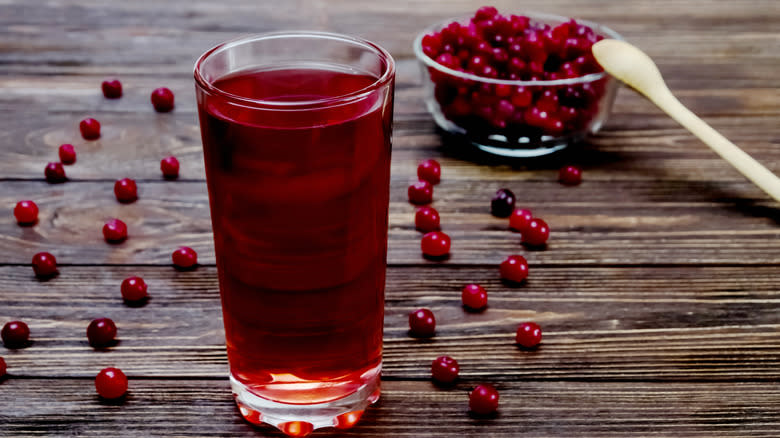The 2 Juice Substitutions You Can Make For Red Wine In Recipes

Cooking with red wine is nothing new, especially considering famous French dishes such as coq au vin and beef bourguignon, as well as spaghetti, venison stew, and wine-soaked grilled meats. Depending on the type of red wine, whether dry or sweeter, the addition can flood foods with intense savory flavors or a tinge of light and airy sweetness. Even more important, wine brings acidity to the cooking process, which helps tenderize meats and keep them moist while cooking. While all that is admirable, not all home chefs choose to incorporate wine into their culinary repertoire.
Whatever the reason for leaving wine out of the equation, there's no need to bypass otherwise richly tantalizing vino-centric recipes. Tasty non-alcoholic substitutes for red wine exist, and in some cases, even take favorite dishes on unexpected flavor journeys. Two in particular impact recipes with their own special characteristics: pomegranate juice and cranberry juice. Neither are subtle, instead permeating routine meals with noticeable flavor -- which is exactly what red wine does.
Both of these juices have similar traits to red wine, specifically the color, but varying levels of sweetness and acidity can be balanced. Pomegranate and cranberry juices also bring pretty impressive health-enhancing attributes to the kitchen party. Both carry a wealth of antioxidants, while pomegranate juice potentially helps lower blood pressure, and cranberry is touted for helping thwart or improve urinary tract infections.
Read more: 21 Delicious Ways To Use Up Leftover Rice
Up Your Kitchen Game With Pomegranate And Cranberry Juices

Swapping out red wine for pomegranate juice is a no-brainer, as the two are strikingly similar in color, flavor, aroma, and acidity. The deep fruitiness of pomegranates is especially evident when concentrated into a juice, and all that goodness goes straight into your stews, pasta, meats, vegetable glazes, sauces, and marinades. It's pretty much an even exchange with red wine in quantity, though you may want to add a bit more acidity to pomegranate juice to increase tartness. A splash of white vinegar should do the trick.
Cranberry juice is an ideal substitute for cooking with bold, dry, red wines such as cabernet sauvignon, Pinot Noir, or Syrah. It's inherently rich and tart, deepening other flavors and ingredients in your recipes. A ratio of 1:1 works just fine, and the tartness is already comparable to wine. But cranberries are naturally quite sweet. In this case, a dash of lemon or lime juice can tone down the sweetness, if desired.
With both these red wine cooking substitutions, seek out versions with little or no added sugar or other ingredients that could alter the taste of the dish you're making. Overly processed juices can lack the acidity that's vital for the cooking qualities you're seeking. Whole-pressed 100% pomegranate juice in particular is often available in refrigerated sections of supermarkets. Even better, make your own from fresh pomegranate arils.
Read the original article on Tasting Table

